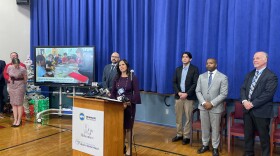-
An audit found that Milwaukee Public Schools overspent its budget last school year by $46 million. Now, leaders are considering cuts to jobs.
-
Milwaukee’s Common Council will soon finalize next year’s $2 billion city budget. But there is a smaller pot of money that Milwaukee residents will have a direct say on how it is spent.
-
As the federal government sliced health care coverage over the next decade, Wisconsin, too, passed its budget. How will it impact people with Medicaid coverage, SNAP benefits or child care needs?
-
Evers signed a new two-year budget Thursday to ensure the state gets a federal Medicaid match that it would lose under Trump's tax and spending cuts package.
-
Democratic Gov. Tony Evers proposed $3.3 billion for the state’s public schools. But Republicans who control the budget committee want to spend much less: just $336 million.
-
Milwaukee Public Schools leader Dr. Brenda Cassellius released her proposed budget, which includes money for lead paint cleanup and changes to how principals can use budgets.
-
Lake Effect's Audrey Nowakowski speaks with arts advocates about the work they’re doing to increase state funding for the arts.
-
The next budget hearing is this Friday, April 4, in West Allis.
-
The Wisconsin Supreme Court heard oral arguments Wednesday on a budget veto by Gov. Tony Evers that would affect school funding through 2425.
-
Here's what you need to know about the Milwaukee Mayor Cavalier Johnson's proposed $200 million dollar budget before it's finalized.
Play Live Radio
Next Up:
0:00
0:00
Available On Air Stations










